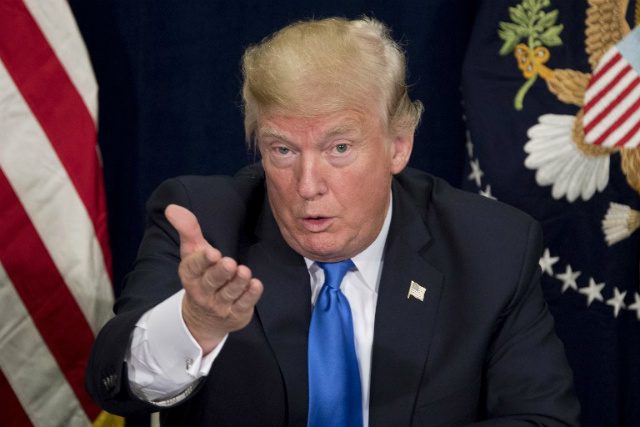SUMMARY
This is AI generated summarization, which may have errors. For context, always refer to the full article.

WASHINGTON DC, USA – Despite fierce opposition from inside the White House, US President Donald Trump on Thursday, March 1, announced punishing steel and aluminum tariffs, teeing up a possible trade war with major producers as well as China.
Trump ended rumor and counter-rumor about his administration’s intentions, by saying that “next week” he would sign off on measures designed to protect US producers.
Meeting at the White House with industry representatives, Trump announced tariffs of 25% on steel and 10% on aluminum, materials that are the lifeblood of the construction and manufacturing sectors.
“We’re going to be instituting tariffs next week,” Trump said, adding they will be in place “for a long period of time.”
With Wall Street already uneasy, the news sent US stocks plunging with the benchmark Dow Jones Industrial Average losing as much as 2.3%.
Asia followed on Friday, March 2, with Tokyo, Hong Kong, Sydney and Seoul all sharply down in early trade.
The announcement was greeted with fury among key US allies such as Canada, the EU and Mexico.
Its timing is also provocative for China, coming as top economic envoy Liu He was Washington and holding meetings at the White House.
Beijing has previously warned it was ready with countermeasures should the Trump administration slap on tarrifs.
European Commission chief Jean-Claude Juncker said the EU “will react firmly” to defend its interests.
“The Commission will bring forward in the next few days a proposal for WTO-compatible countermeasures against the US to rebalance the situation,” he said in a statement, referring to the World Trade Organization.
“We will not sit idly while our industry is hit with unfair measures that put thousands of European jobs at risk,” he added.
‘Unacceptable’
Canadian Trade Minister Francois-Philippe Champagne responded even more bluntly, calling the tariffs “unacceptable.”
“Any tariffs or quotas that would be imposed on our Canadian steel and aluminum industry would be unacceptable,” Champagne told parliament. Any such decision would have an impact on both sides of the border.”
He added that Canada “will defend our workers and our steel and aluminum industries.”
The Mexican steel industry association Canacero, called on the Mexican government to “immediately respond in a reciprocal manner,” unless the country’s producers are excluded.
US automakers, oil and gas producers and other industry groups publicly urged the president not to impose new trade barriers on the metal imports, warning the measures could jack up prices and invite tit-for-tat reprisals, harming the economy.
The tariffs also come as the White House has embarked on a campaign to renew American infrastructure, with steel likely a major input.
Two agricultural groups, the National Association of Wheat Growers and US Wheat Associates, said in a joint statement they were “extremely disappointed” in the decision.
“It is dismaying that the voices of farmers and many other industries were ignored in favor of an industry that is already among the most protected in the country,” the statement said.
Sources familiar with Trump’s decision say he also faced stern opposition from aides, including top economic advisor Gary Cohn, who argued the move could ultimately damage US industry.
Up to the last moment, there were doubts about whether Trump would pull the trigger. But trade hawks like Peter Navarro – a presidential aide who, after weeks on the sidelines, was by the president’s side as he made his remarks – appeared to have won the day.
The same sources said it is not impossible that the shock announcement is followed by carve outs that make the measures more palatable to allies in Europe, Canada and South Korea.
Making steel great again?
Trump said the action was aimed at addressing “phenomenal” cheating in the market.
“We’ll have much more vibrant companies and then the rest will be up to management to make them truly great,” he added. “If you could ever make US steel like it used to be, we would be very happy. I actually think it’s possible.”
Trump’s decision, which leans on a rarely used trade provision allowing protections for national security, could also hit other countries far more than China, which has been the main target of the administration’s trade anger.
China is the world’s largest steel producer but accounts for less than 1% of US imports and sells only 10% of its wrought aluminum abroad. Steel producers in Canada, Brazil, Mexico, South Korea and Turkey rely for more heavily on the US market.
The Commerce Department said last month it determined that the global glut of steel and aluminum threatened US national security, and presented the White House with a set of options, including quotas, tariffs targeting specific countries, or across-the-board tariffs on all imports of aluminum and steel.
Trump’s proposal most closely resembled the last option.
In testimony on Capitol Hill, newly-installed Federal Reserve Chairman Jerome Powell said he did not favor the use of tariffs to support those harmed by free trade.
“The tariff approach is not the best approach,” said Powell.
“The best approach is deal directly with the people who are affected rather than falling back on tariffs.” – Rappler.com
Add a comment
How does this make you feel?
There are no comments yet. Add your comment to start the conversation.